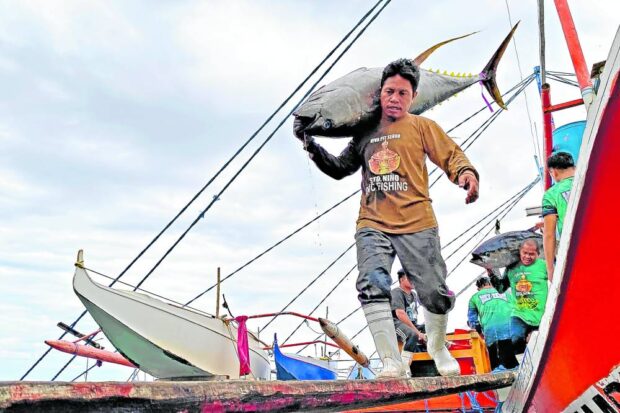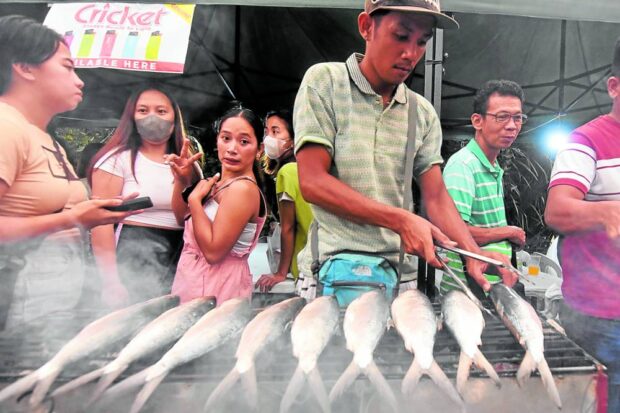
BIG CATCH | In this photo taken last month, a porter unloads a large yellowfin tuna from a fishing vessel at the port of General Santos City, a major trading hub of tuna in Mindanao. (Photo by ERWIN MASCARIÑAS / Inquirer Mindanao)
MANILA, Philippines — The El Niño phenomenon may affect the country’s fisheries production on account of higher water temperature and lower water levels, the Bureau of Fisheries and Aquatic Resources (BFAR) said on Wednesday.
In an interview, BFAR chief information officer Nazario Briguera said El Niño both has positive and negative impacts on the fisheries sector.
“Based on our records, the production of pelagic (open water) fishes such as tuna and sardines increases because of warm temperature in the sea,” Briguera said in Filipino.
However, he said El Niño might affect the output of land-based aquaculture species, including “bangus” (milkfish) and tilapia.
“This weather phenomenon will affect land-based aquaculture due to the declining water level,” he said.
Briguera said El Niño would also reduce the level of dissolved oxygen in water, which could lead to fish kill episodes.
The BFAR official, however, did not provide any projection on the threat of El Niño to the country’s fish yield but assured consumers that there would be enough supply of both aquaculture and marine species.
Briguera said the potential impact of El Niño could be avoided if mitigating measures would be implemented and “good aquaculture practices” would be applied.

NOW GRILLING “Bangus” (milkfish) is Dagupan City’s top aquaculture product and is celebrated during the annual Bangus Festival, which also features the street grilling party held on April 30. —WILLIE LOMIBAO
Impact on crops
Separately, the Department of Agriculture (DA) is expecting some major crop-producing provinces to be hit by El Niño, specifically areas that produce rice and high-value crops.
“We are hoping that the impact of El Niño will not be that strong but we are assuring the DA and the entire government is prepared,” said U-Nichols Manalo, officer in charge director for DA’s Field Operations Service.Manalo noted the rice and corn sectors lost P10.7 billion due to the El Niño phenomenon in 2019.
He said they had sought an initial budget of P18 million to conduct cloud-seeding operations in areas projected to be affected by the dry spell.
The Philippine Atmospheric, Geophysical and Astronomical Services Administration (Pagasa) earlier raised an El Niño Alert as it warned of a severe dry spell to hit the country. Dry conditions are expected between June and August and may last until the early part of 2024.
The Kilusang Magbubukid ng Pilipinas (KMP) said the government should start prepositioning aid and subsidies for farmers and fisherfolk.
“It is high time for the DA to grant P15,000 production subsidies for farmers and fishers. Important support services including seeds, farm inputs and implements are also needed to counter the increasing costs of production,” the group said in a statement.
“If the condition worsens, farmers may not be able to plant in the coming planting season due to lack of rainwater and irrigation. This could affect our agriculture and fisheries output, especially rice and vegetable yield. Fisheries and aquaculture output could also be lower than normal as fishes move and disperse into deeper parts of the water,” it added. The Department of the Interior and Local Government (DILG) also asked local government units (LGUs) to beef up their contingency measures to cushion the impact of the severe dry spell.
“Conserving water is one of the key actions needed to be taken to mitigate effects of El Niño and as public servants, we must set an example. These precautionary steps, albeit small, can make a big difference that can affect our communities,” Interior Secretary Benhur Abalos said in a statement on Wednesday.
The DILG also directed LGUs to implement and update their existing contingency plans related to El Niño, and to stockpile food and nonfood items for immediate relief assistance.

